Serving 527 students in grades Prekindergarten-5, Morris Elementary School ranks in the bottom 50% of all schools in Alabama for overall test scores (math proficiency is bottom 50%, and reading proficiency is bottom 50%).
The percentage of students achieving proficiency in math is 12% (which is lower than the Alabama state average of 29%). The percentage of students achieving proficiency in reading/language arts is 39% (which is lower than the Alabama state average of 47%).
The student:teacher ratio of 19:1 is higher than the Alabama state level of 17:1.
Minority enrollment is 88% of the student body (majority Black), which is higher than the Alabama state average of 49% (majority Black and Hispanic).
Quick Stats (2025)
- Grades: Prekindergarten-5
- Enrollment: 527 students
- Student:Teacher Ratio: 19:1
- Minority Enrollment: 88%
- Overall Testing Rank: Bottom 50% in AL
- Math Proficiency: 12% (Btm 50%)
- Reading Proficiency: 39% (Btm 50%)
- Science Proficiency: 20-24% (Btm 50%)
- Source: National Center for Education Statistics (NCES), AL Dept. of Education
Top Rankings
Morris Elementary School ranks among the top 20% of public schools in Alabama for:
Category
Attribute
Most improved public schools
Diversity
Percent Eligible For Free Lunch
School Overview
Morris Elementary School's student population of 527 students has declined by 50% over five school years.
The teacher population of 28 teachers has declined by 56% over five school years.
Grades Offered
Grades Prekindergarten-5
Total Students
527 students
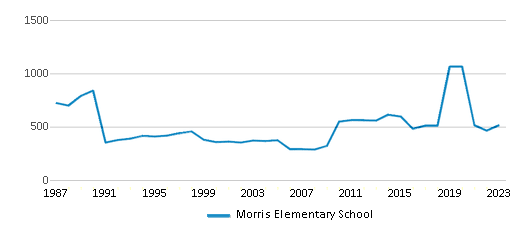
Gender %
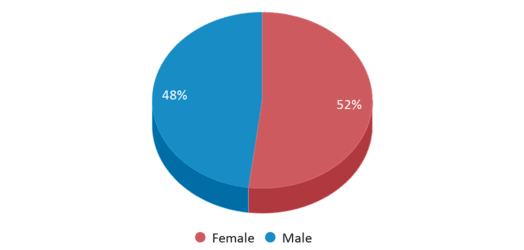
Total Classroom Teachers
28 teachers
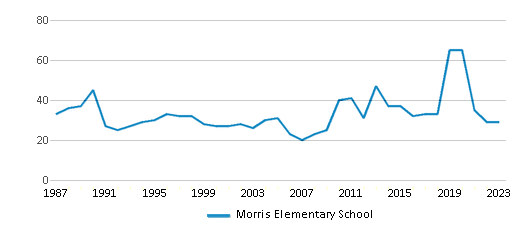
Students by Grade
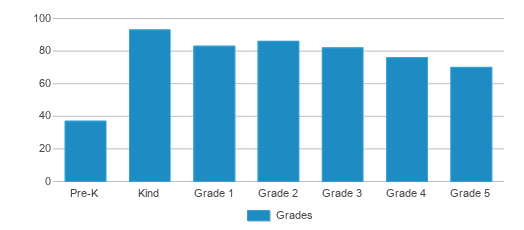
School Rankings
Morris Elementary School ranks within the bottom 50% of all 1,285 schools in Alabama (based off of combined math and reading proficiency testing data).
The diversity score of Morris Elementary School is 0.67, which is more than the diversity score at state average of 0.63. The school's diversity has stayed relatively flat over five school years.
Overall Testing Rank
#833 out of 1285 schools
(Bottom 50%)
(Bottom 50%)
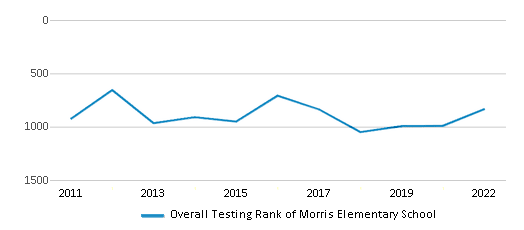
Math Test Scores (% Proficient)
12%
29%
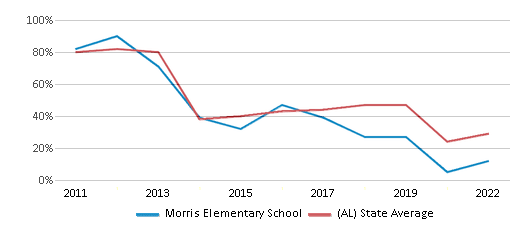
Reading/Language Arts Test Scores (% Proficient)
39%
47%
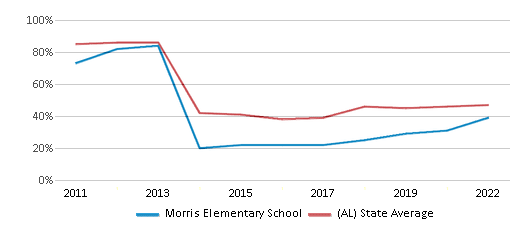
Science Test Scores (% Proficient)
20-24%
38%
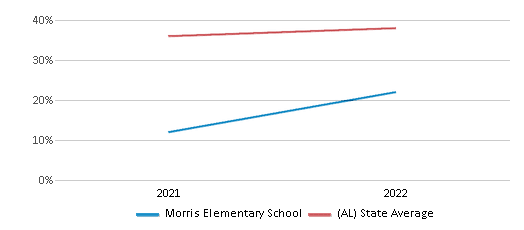
Student : Teacher Ratio
19:1
17:1
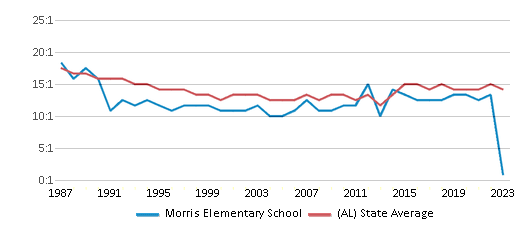
American Indian
n/a
1%
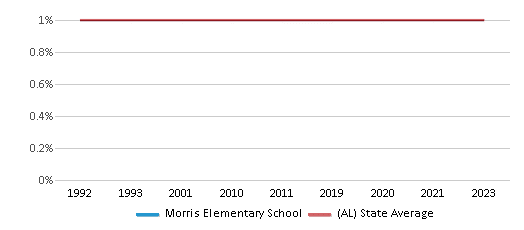
Asian
1%
1%
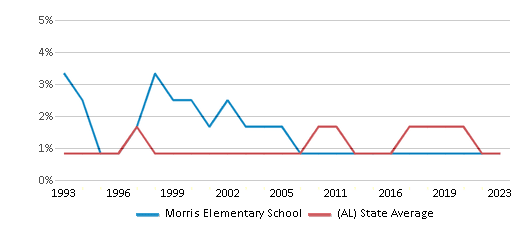
Hispanic
34%
11%
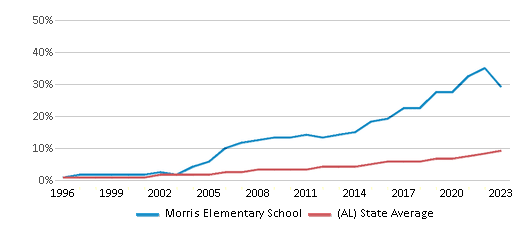
Black
45%
32%
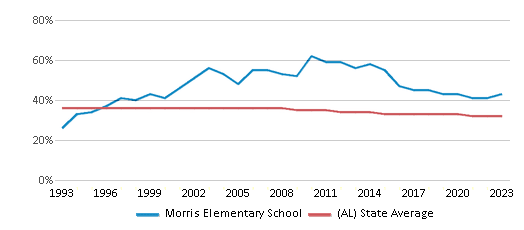
White
12%
51%
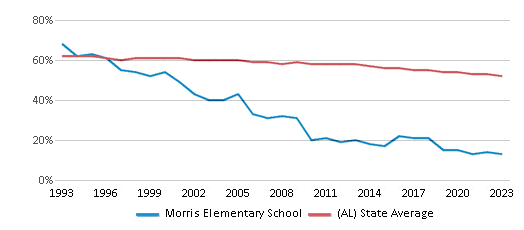
Hawaiian
1%
n/a
Two or more races
7%
4%
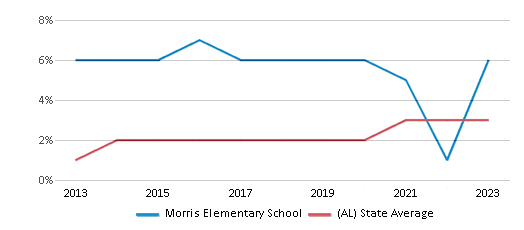
All Ethnic Groups
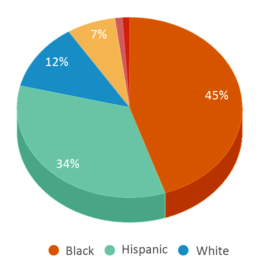
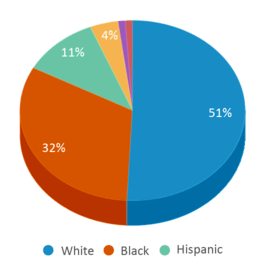
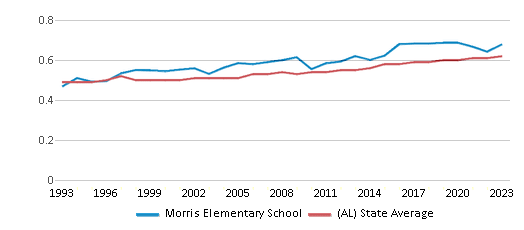
Participates in the National School Lunch Program (NSLP)
Yes
Eligible for Free Lunch
88%
56%
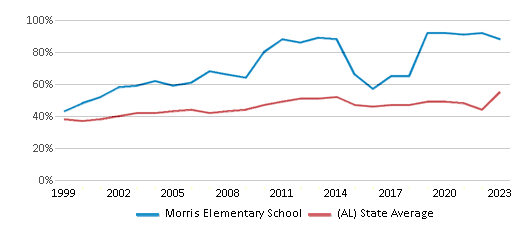
Eligible for Reduced Lunch
2%
5%
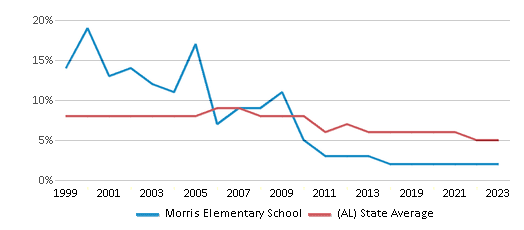
School Statewide Testing
School District Name
Source: National Center for Education Statistics (NCES), AL Dept. of Education
Profile last updated: 02/09/2025
Frequently Asked Questions
What is Morris Elementary School's ranking?
Morris Elementary School is ranked #833 out of 1,285 schools, which ranks it among the bottom 50% of public schools in Alabama.
What schools are Morris Elementary School often compared to?
Morris Elementary Schoolis often viewed alongside schools like Mcdonnell Elementary School, Ridgecrest Elementary School, Tanner Elementary School by visitors of our site.
What percent of students have achieved state testing proficiency in math and reading?
12% of students have achieved math proficiency (compared to the 29% AL state average), while 39% of students have achieved reading proficiency (compared to the 47% AL state average).
How many students attend Morris Elementary School?
527 students attend Morris Elementary School.
What is the racial composition of the student body?
45% of Morris Elementary School students are Black, 34% of students are Hispanic, 12% of students are White, 7% of students are Two or more races, 1% of students are Asian, and 1% of students are Hawaiian.
What is the student:teacher ratio of Morris Elementary School?
Morris Elementary School has a student ration of 19:1, which is higher than the Alabama state average of 17:1.
What grades does Morris Elementary School offer ?
Morris Elementary School offers enrollment in grades Prekindergarten-5
What school district is Morris Elementary School part of?
Morris Elementary School is part of Huntsville City School District.
School Reviews
5 1/19/2016
Previous reviews of this school prior to my family moving into the school district, spoke of a school lacking in so many areas. I find this to be a gross slander of an awesome school that is fighting against the odds. It is lead by a principal that meets and greets every student upon arrival with positive statement to remind them; they are preparing for collegiate aspirations and that all things are possible with hard work. They care for each and every child as if they were their own. It is good to remember that all educational success requires parental participation at the elementary level and not just that of the child and teacher. We can't rely on the school to be the sole provider of our children's education and also act as a daycare for absent parenting. With my child having previously attended elementary in Madison and being labeled as "slow", the facility at Morris took time to understand what areas needed a different approach to have the instruction understood and comprehended. AWESOME, AWESOME, AWESOME. Kudos to the underdog!
Review Morris Elementary School. Reviews should be a few sentences in length. Please include any comments on:
- Quality of academic programs, teachers, and facilities
- Availability of music, art, sports and other extracurricular activities
Recent Articles

What Is A Charter School?
Explore the world of charter schools in this comprehensive guide. Learn about their history, how they operate, and the pros and cons of this educational innovation. Discover key facts about charter schools, including admission policies, demographics, and funding, as well as what to look for when considering a charter school for your child.

10 Reasons Why High School Sports Benefit Students
Discover the 10 compelling reasons why high school sports are beneficial for students. This comprehensive article explores how athletics enhance academic performance, foster personal growth, and develop crucial life skills. From improved fitness and time management to leadership development and community representation, learn why participating in high school sports can be a game-changer for students' overall success and well-being.

February 05, 2025
Understanding the U.S. Department of Education: Structure, Impact, and EvolutionWe explore how the Department of Education shapes American education, from its cabinet-level leadership to its impact on millions of students, written for general audiences seeking clarity on this vital institution.






